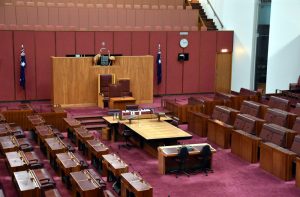On Tuesday, Australia’s Senate Foreign Affairs, Defense and Trade References Committee published its report into the funding of public research into foreign policy.
The report’s leading recommendation calls on the government to “investigate options for the best model for effective foreign policy research settings, including how to best fund this model, to ensure the Australian community and business is best placed to understand and respond to a rapidly changing geostrategic environment.”
The long shadow of Australia-China relations frequently loomed over the inquiry, given that its terms of reference placed a focus on Australia’s “key interests in the Indo-Pacific.” As Committee Chair Senator Kimberley Kitching noted, “it’s no secret that a more aggressive China is forcing us to rethink how we in-turn engage in our region.”
The report emphasizes that the “foreign policy practices and procedures of preceding decades are no longer fit for purpose.”
While the inquiry has not garnered much fanfare and interest outside those in the foreign policy field, it has consequences for the broader Australian community in light of the increasingly blurred boundaries between the domestic and international dimensions of public policy.
In Australia, this has been seen in the economic implications of China’s unilateral trade strikes over recent years; it is also visible in the strategic shift and size of Australia’s aid spend that has been subject to budget cuts as result of its politicization.
A number of significant points and challenges were raised by respondents to the inquiry, such as the size of the Australian foreign policy community. The Australian Strategic Policy Institute (ASPI) utilized the Global Go To Think Tank Index as evidence of the small size of Australia’s think thank sector. The country boasts just 45 think tanks, compared to 2,203 in the United States and 515 in the United Kingdom.
The Committee acknowledged that Australia has a lesser tradition of private philanthropy or significant corporate sponsorship of public policy research, with Sydney’s Lowy Institute being a notable outlier here. As result, the reliance of organizations on the increasingly competitive and cumbersome grant funding process was evident. The Committee noted that a “more strategic and coordinated approach to the funding of foreign policy research would be of clear benefit.”
A majority of submissions argued for greater funding for the community. However, the Group of Eight (Go8), representing the major universities in Australia, drew the ire of Committee Deputy Chair Senator Eric Abetz, who labelled the criticism in their submission of the quality of research produced by think tanks like ASPI as “embarrassingly self-serving” given their reporting exposed “the rampant foreign interference occurring in those very universities to which they had turned a blind eye.” Abetz argued that the Go8 was more interested in maintaining a financial “status quo” and held an “oligopoly of tax-payers money.”
Sensitivities here are at a high point and are related to concerns over Chinese foreign interference in academia. The recent rejection of a number of applications via the Australian Research Council grants on the grounds that they were against Australia’s national interest was discussed in the inquiry.
Upon the release of the report, Senator Kitching stated that “the processes and ways of thinking that may have served us well in the past will no longer be fit for purpose. And while this may seem confronting, we cannot continue to invest ourselves in a world that no longer exists.”
The Committees recommendations include a specific call for ideas on how empirical research can be promoted and how the government can make “research-relevant data more accessible, identify data gaps and consider commissioning research work to fill such gaps.”
Interestingly, the final recommendation addresses the numerous concerns raised in submissions about the lack of employment fluidity of the Australian Public Service. It recommends the government establish a pilot exchange program between the Department of Foreign Affairs and Trade and foreign policy think tanks and university departments at various levels of seniority.
The inquiry and its report come at a time of growing interest in Australia’s foreign policy. The report and recommendations should serve as a valuable document for the parliament and government to ensure Australia’s future foreign policy research shifts in response to the changing strategic landscape.

































